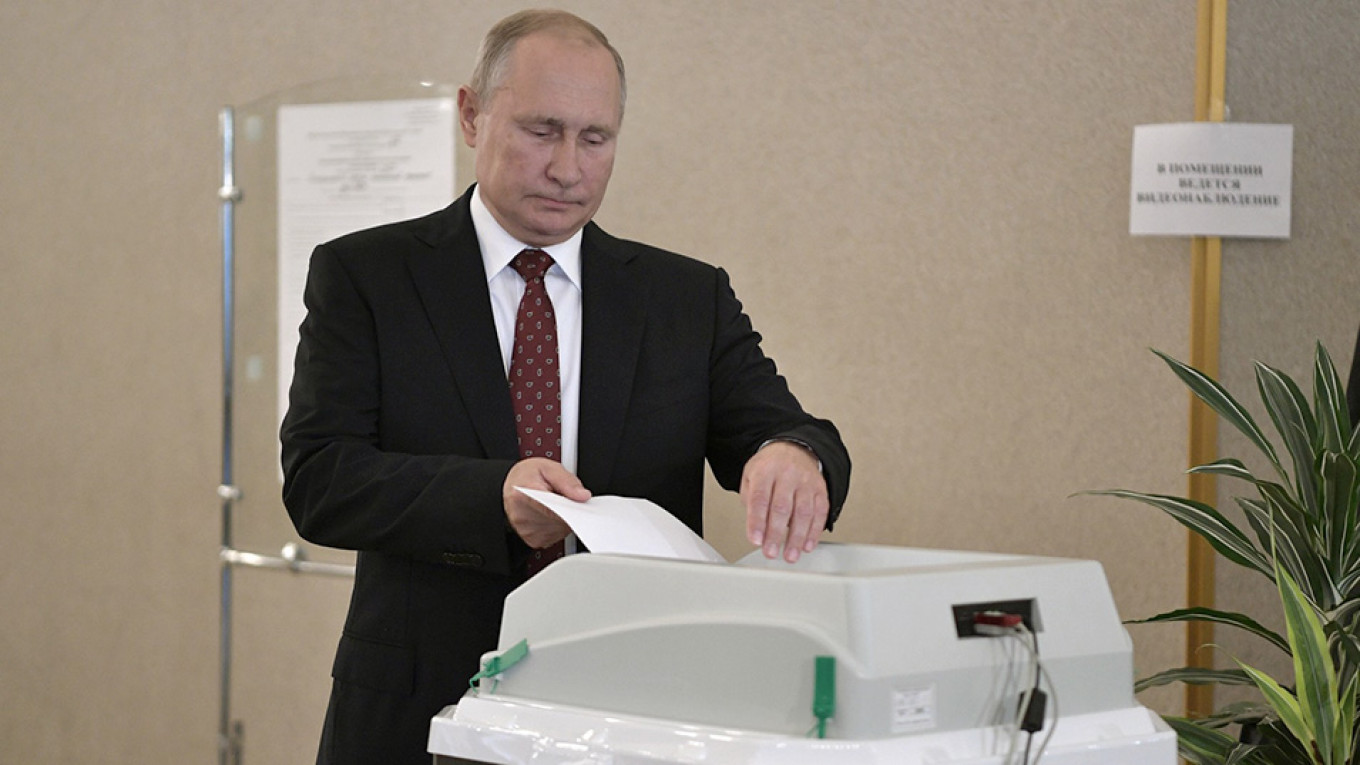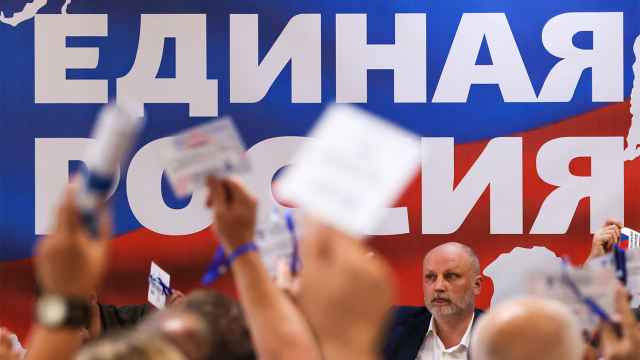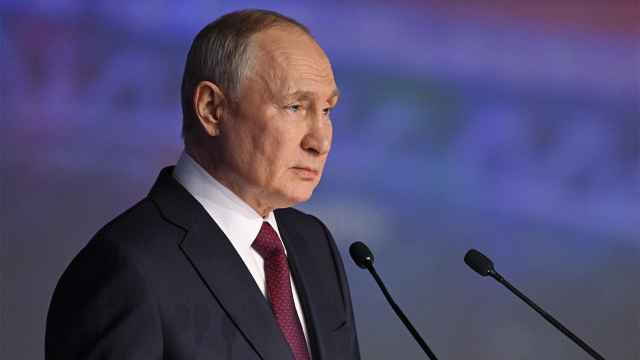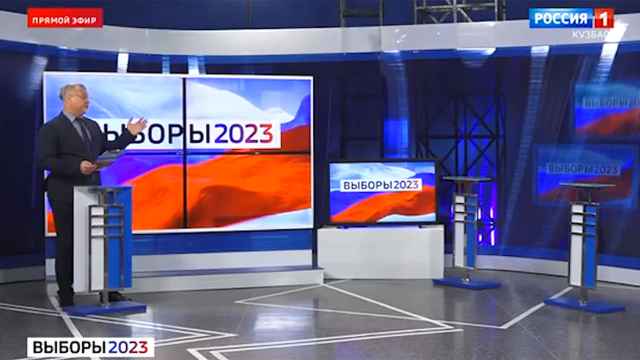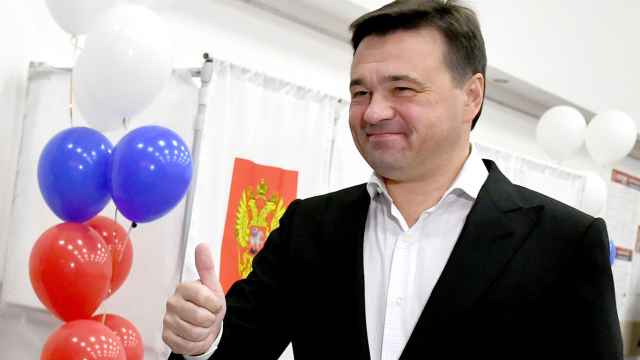Sunday’s local elections in a spate of Russian regions, including the country’s two biggest cities, showed that there’s no way to beat a cardsharp while playing by the rules. Moscow’s summer of protest ended with the pro-Kremlin party, United Russia, commanding a comfortable majority in the city council and some activists beginning prison terms. But the tension under the surface is still there, especially in Moscow. The undeniable message for the Kremlin was that people in the city that sealed the Soviet Union’s fate in 1991 are tired of its methods.
United Russia, the party once led by President Vladimir Putin himself and now headed by Prime Minister Dmitry Medvedev, has been losing popularity. According to Levada Center, Russia’s last independent nationwide pollster, its support stood at a mere 28% in August, down from 39% in 2017. Even state-owned pollster VTsIOM put it at 32.6%. But in all 16 gubernatorial elections held in Russia on Sunday, candidates from United Russia or backed by the party won comfortable majorities.
“Won” is probably the wrong word here. All the “elections” were marked by an absence of fair competition and free access to media; in all, the pro-Kremlin candidates commanded more financial and organizational resources than all their, mostly tame, rivals combined. In St. Petersburg, Putin appointee Alexander Beglov, a tongue-tied bureaucrat with a passion for expensive watches, won 65% of the vote, but fewer than a quarter of the registered voters turned out. They knew it was a farce: Beglov’s strongest rival, popular movie director Vladimir Bortko, backed by the Communist party, had been persuaded to quit the race a week before the vote. “I came to play football but was told I had to play cards with a marked deck that had five aces in it,” was the way Bortko described the set-up.
Moscow Mayor Sergei Sobyanin wasn’t up for re-election on Sunday. He did, however, have to defend his status as a political heavyweight with a claim on the status of Putin’s successor. The city council election in the capital was the most contentious since the largely powerless body was set up in 1993. A number of young politicians from what’s known in Russia as the “non-system opposition” — smaller parties and movements that don’t make deals with the Kremlin, including corruption fighter Alexei Navalny’s group — decided to participate.
They had stellar chances, especially in those areas with higher concentrations of the city’s relatively free-thinking intellectual elite, but all of them were barred from running for allegedly faking signatures they’d had to collect to be put on the ballot. When the barred candidates tried to organize protests, their supporters were beaten and detained, and the candidates themselves were forced to spend much of the campaign in administrative detention. One of them, Ilya Yashin, was sentenced to 10 days in a holding cell five times in a row; police released him at the end of each 10-day stretch immediately to pick him up again. Yashin only walked free the day before the vote.
Sometimes the authorities would allow the protesters to hold a rally. The biggest of these attracted 60,000 mostly young people last month as rap stars and popular YouTubers called on their audiences to speak up against police violence. But both Sobyanin and the Kremlin went out of their way to prove any protests taking place without official permission would be put down and their most active participants prosecuted.
Financier Vladislav Sinitsa was sentenced to five years in a penal colony for a blog post suggesting the children of the most brutal riot cops could be victimized for what their fathers did. Computer repairman Ivan Podkopaev got three years for using pepper spray on two cops. Small entrepreneur Danila Beglets went to prison for two years for allegedly pushing a cop. And so on. Faced with this ruthless intimidation campaign, Kremlin opponents called on their followers to resort to tactical voting — “smart voting,” as Navalny dubbed it. He told his supporters to vote for candidates who had the best chances to defeat those backed by United Russia.
The Kremlin party, aware of its unpopularity in the capital, didn’t field any candidates directly. But the whole city knew who were the Kremlin’s people, especially since most were incumbent council members. Controversially, Navalny endorsed mostly Communist Party candidates as the ones with the best chances against the Kremlin team; that put off many Moscow liberals, who chose either to stay home or intentionally to spoil their ballots.
Navalny’s tactic bore fruit to some extent, however. With a turnout of just 21%, pro-Kremlin candidates got 25 seats on the 45-member city council, down from 38 after the 2014 election. The Communist Party won 13, tame center-left party Fair Russia garnered three, the liberal Yabloko four.
That’s not much of a liberal opposition victory: Some of the Communists Navalny backed are straight-up Stalinists, and a number of other winners are oddballs. But then, the city council lacks the power to do much in Moscow. It has no formal right to challenge the mayor on how he spends the city budget, for example. Who got the seats is less important than the success of Navalny’s ploy. It shows his power in the city is comparable to that of United Russia, even though he’s locked out of participating in elections.
Putin and Sobyanin are already ignoring the protest vote. In a Twitter thread on Monday morning, the mayor hailed a “truly competitive election” that has produced a more diverse city council. And indeed, the summer wave of protest has subsided, in part thanks to the intimidation campaign. The low election turnout suggests most Muscovites are apathetic about politics or at least don’t think they can change the status quo. Even so, more than half of those Muscovites who turned out on Sunday were willing to support anyone except the Kremlin candidates.
That’s a scary result for the Kremlin after this summer’s suppression. It means the only way it can win is by cheating and using force — not a sustainable state of affairs in the long run.
This article was originally published by Bloomberg.
A Message from The Moscow Times:
Dear readers,
We are facing unprecedented challenges. Russia's Prosecutor General's Office has designated The Moscow Times as an "undesirable" organization, criminalizing our work and putting our staff at risk of prosecution. This follows our earlier unjust labeling as a "foreign agent."
These actions are direct attempts to silence independent journalism in Russia. The authorities claim our work "discredits the decisions of the Russian leadership." We see things differently: we strive to provide accurate, unbiased reporting on Russia.
We, the journalists of The Moscow Times, refuse to be silenced. But to continue our work, we need your help.
Your support, no matter how small, makes a world of difference. If you can, please support us monthly starting from just $2. It's quick to set up, and every contribution makes a significant impact.
By supporting The Moscow Times, you're defending open, independent journalism in the face of repression. Thank you for standing with us.
Remind me later.



